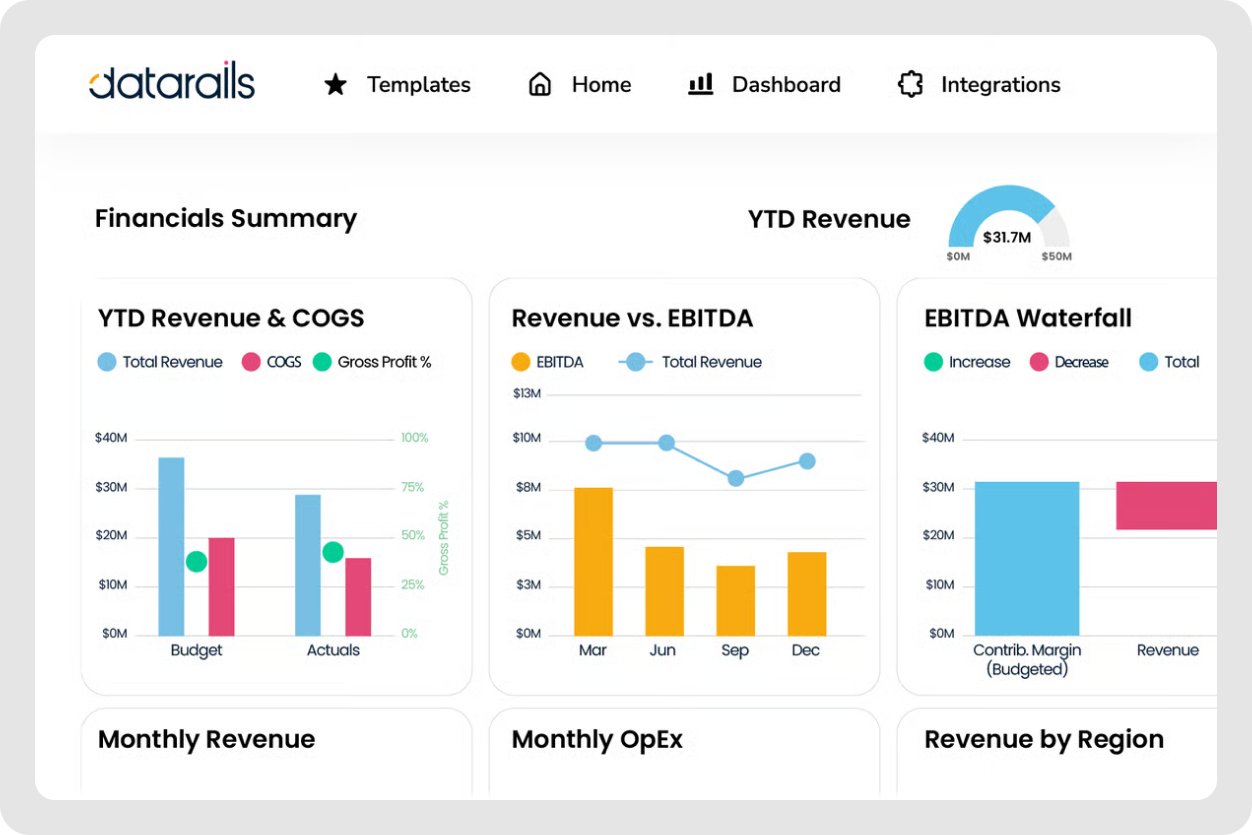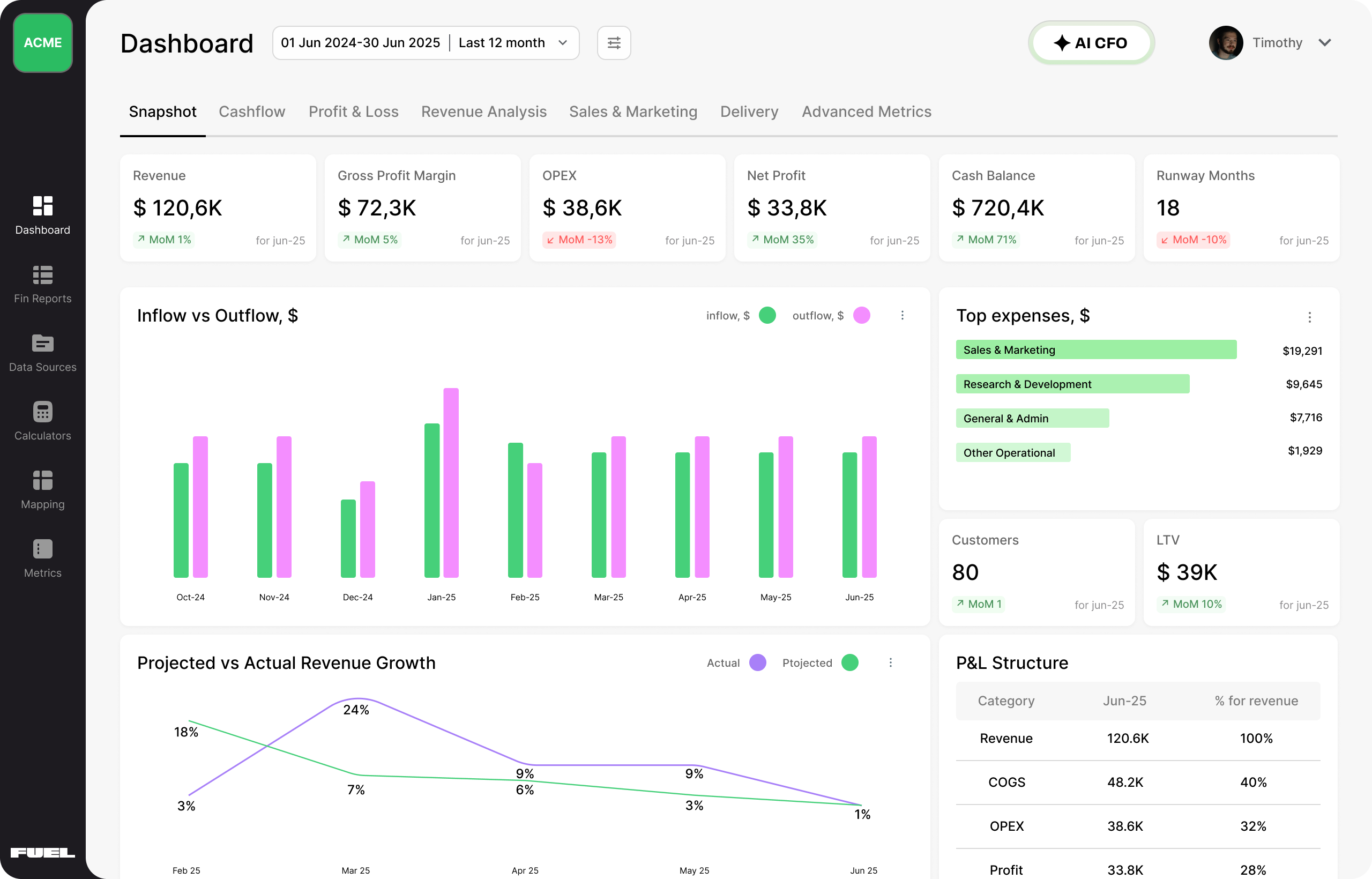


Are you caught between Datarails and Cube, trying to figure out which financial planning software is the perfect fit for your business? Both tools bring strong features to the table, but picking the right one can feel like choosing between Golden Delicious and Granny Smith.
Both tools are popular choices, offering features like automation, reporting and integrations. But which one aligns with your goals, budget and team size?
In this article, we’ll break down the key features and integrations of these two FP&A software, making it easier for you to decide. And if neither feels like “the one,” don’t worry – there’s another standout option: Fuelfinance, designed with agencies, SMBs and professional services in mind.

Datarails is an FP&A software suitable for those who prefer working in Excel but need to automate financial planning. Its detailed dashboards help consolidate and visualize large volumes of data, making it popular with mid-market and large companies handling complex budgets and forecasts.
If you’re running a smaller business or startup, though, you might want to explore these Datarails competitors for options that better match your needs.

Cube is a scalable FP&A software suitable for businesses of all sizes, as it grows with your business. It's mostly used for the financial process of forecasting, budgeting, reporting and planning.
You can use Cube to analyze your financial performance in Excel or Google Sheets, or you can use the Cube platform if you want to avoid spreadsheets (even Google Sheets).
Both Datarails and Cube focus on improving financial planning for teams familiar with Excel, but they cater to slightly different needs.
We will compare the most prominent features, benefits, integrations and customer support of these two software to help you make an informed decision and find the best financial analysis software for you.
Here are the key features and differences between these two tools.
Apart from standard planning and in-depth analysis, Datarails, as an FP&A solution, also has FP&A Genius, a chatbot designed to answer finance-related questions. This feature provides quick access to information like budgeting insights, historical data analysis and future projections to support informed decision-making.
Additionally, Datarails supports collaboration through file version tracking and team feedback, which can improve teamwork during financial planning processes.
Datarails has also added more AI-driven automation for tasks like cash-flow tracking and month-end reporting, reducing the amount of manual data preparation finance teams have to do. However, the FP&A Genius is mostly conversational, so you need to know what to ask in order to get actionable answers. It also includes consolidation features, audit trail and version control, helping make one source of truth for financial information.
Cube focuses on automating financial consolidation with tools that integrate data from multiple sources to create roll-ups, which summarize data into higher-level totals and drill-downs, which break data into detailed components for deeper analysis. It includes features for data governance, audit trail and user permissions. Cube's data engine maps, cleans and structures raw data, giving you a single source of truth.
Cube and its multi-currency support help you evaluate your data in both local and reporting currencies, making it a practical solution for international finance teams. It has full FP&A coverage, with ad-hoc reporting, cash flow reporting, variance analysis, headcount planning and more.
Datarails software allows you to create data-driven projections based on large volumes of data and formulas. Whether you need to forecast revenue, costs, cash flow or headcount, you can select the metrics that matter to you and your finance teams and determine the frequency: weekly, monthly, quarterly or annually.
On the other hand, apart from financial forecasting based on historical data, Cube allows you to set financial goals and objectives for your implementation so you can optimize your operational plans and stick to the budget. It also includes options for multi-dimensional and multi-entity modeling.
Datarails is built for mid to large teams, enabling teams to test scenarios in large, complex Excel models while maintaining consistency across extensive datasets. It’s well-suited for businesses managing detailed financial planning with multiple variables.
Cube, on the other hand, offers straightforward tools to compare scenarios and evaluate strategies. This financial modeling software's multi-currency support gives Cube an edge for international companies that need to analyze data in both local and foreign reporting currencies. It has unlimited scenarios, reports, dashboards and dimensions (under the right plan).
Datarails is a good financial reporting software for large enterprises and companies because it allows you to consolidate data from different channels into a single report. It can automate monthly reporting and significantly reduce the time spent on collecting data manually. It's easy to navigate and comes with all the necessary features.
It can also create AI-generated presentations that turn financial reports into visual formats, making it easier to identify key trends, insights and contextual data for finance teams to analyze and act on.
Cube software is a bit more flexible and offers short implementation times and customizable reporting options based on your preferences. You can either use its Ad-hoc reporting when you need quick last-minute reports or go in-depth with department-wide reports, such as revenue reports, budget variance analysis, workforce and sales planning reports, etc.
The tool also offers an AI Analyst. You can ask natural-language questions like “How did revenue per sales rep trend last quarter?” or “Which departments are above budget?” to get smart, navigable reports. That means you get instant insights and variance analysis, straight from your data. This feature covers conversational agents, automated analysis, mapping and forecasting.
Whether you're using Excel, Google Sheets or the Cube platform, you can create interactive reports and collaborate with colleagues or stakeholders.
Cube also improves data confidence by automating data validation and error-checking, eliminating the need for manual verification cell-by-cell and row-by-row.
Apart from native Excel integration, Datarails software integrates with different accounting software, ERP systems, CRM platforms, HRIS solutions and payment systems. It has over 200 integrations, including BambooHR, Oracle NetSuite, HubSpot, Xero and Shopify, making it ideal for large enterprises.
On the other hand, Cube may not have that many native integrations, but you can connect it to virtually any tool or software using SQL, REST and GraphQL APIs. When it comes to built-in integrations, there are data warehouses such as Google BigQuery and Databricks, BI tools such as Tableau and Power BI and many more. Note that some user reviews report that certain integrations may be slow or not ideal for very large datasets/teams, especially with many simultaneous users.
Both platforms don't have publicly available pricing plans on their websites; they offer customized pricing. Both Datarails and Cube consider factors such as your specific reporting, planning or analysis objectives, as well as the number of users and integrations needed.
If you want to get a custom quote from both of these tools, you need to complete the form on their websites. However, bear in mind that Datarails targets mid- and large enterprises, so it might be pricier than Cube and other similar financial management solutions.
Datarails offers two types of customer support: you can either submit a support request on their website or send them an email. Customer service is quick, as they usually answer within 24 hours. However, you can't contact Datarails via phone or schedule a meeting.
Cube offers live chat and email support to assist users with questions, troubleshooting and feature inquiries. Their support team is known for being responsive and providing helpful solutions.
Cube also offers dedicated customer success managers for some plans who work closely with clients to ensure that software meets their needs and helps optimize the platform for their specific use case.
Datarails is built for enterprises, Cube sticks to spreadsheets – but what about small businesses and forward-thinking agencies that want finance to be easy and help them grow without needing a financial degree? Fuelfinance gives you a proactive AI copilot, automated reports, real-time cash flow tracking and expert financial support without the extra hires.
Check out how Fuelfinance helped ColdIQ grow by 236% in just 8 months with a profitability-first financial system.
No clunky systems, no manual updates – just straightforward financial management that actually works for you.

Our FP&A software is a cloud-based small business financial management software tailored for agencies, founders, professional services and SMBs, making financial management simple and stress-free. With Fuelfinance, you don’t just get software – you also get a human outsourced CFO, ready to guide you with expert support whenever you need it.
See also: 8 Best AI Forecasting Tools (Ranked & Compared)
Fuelfinance is designed to adapt to your business needs, giving you the tools to manage finances effortlessly at any stage. From budgeting to investor-ready reports, everything is built to help you grow without limitations. Book a demo and see it in action!
At Fuelfinance, we know how difficult starting your own business can be. The last thing you need is complicated financial management tools created for financial professionals.
That's why we've created an easy solution tailored for small businesses and startup founders, helping them gain control over their finances, even if they don't have any financial background or expertise.
Additionally, in just seconds, you and your FP&A teams will have a financial plan ready, as well as unlimited support from our financial experts.
Shortly put, Fuelfinance provides you with summary-level insights, enabling you to quickly understand key metrics and performance trends without spending too much time analyzing details.
Book a demo call today and discover how Fuelfinance can automate your financial processes and forecasting, and why our clients say it's the most user-friendly, easy-to-navigate tool they've ever tried.
Datarails doesn’t publicly list its pricing since costs depend on business size and needs. It’s generally used by enterprises, so pricing is likely structured for larger teams with complex financial operations.
Yes, Datarails is a SaaS (Software-as-a-Service) company that provides cloud-based FP&A solutions for financial reporting, budgeting and analysis.
There are several alternatives to Datarails, but Fuelfinance stands out for startups and small businesses. Unlike enterprise-focused tools, it offers real-time financial insights, automation and expert support – all designed to simplify financial management without the complexity of larger systems.
Cube is a financial planning and analysis (FP&A) software that integrates with Excel and Google Sheets, helping businesses manage budgets, forecasts and financial reporting.


Just imagine how that would transform your team’s productivity and focus? Talk to our financial experts to know more.